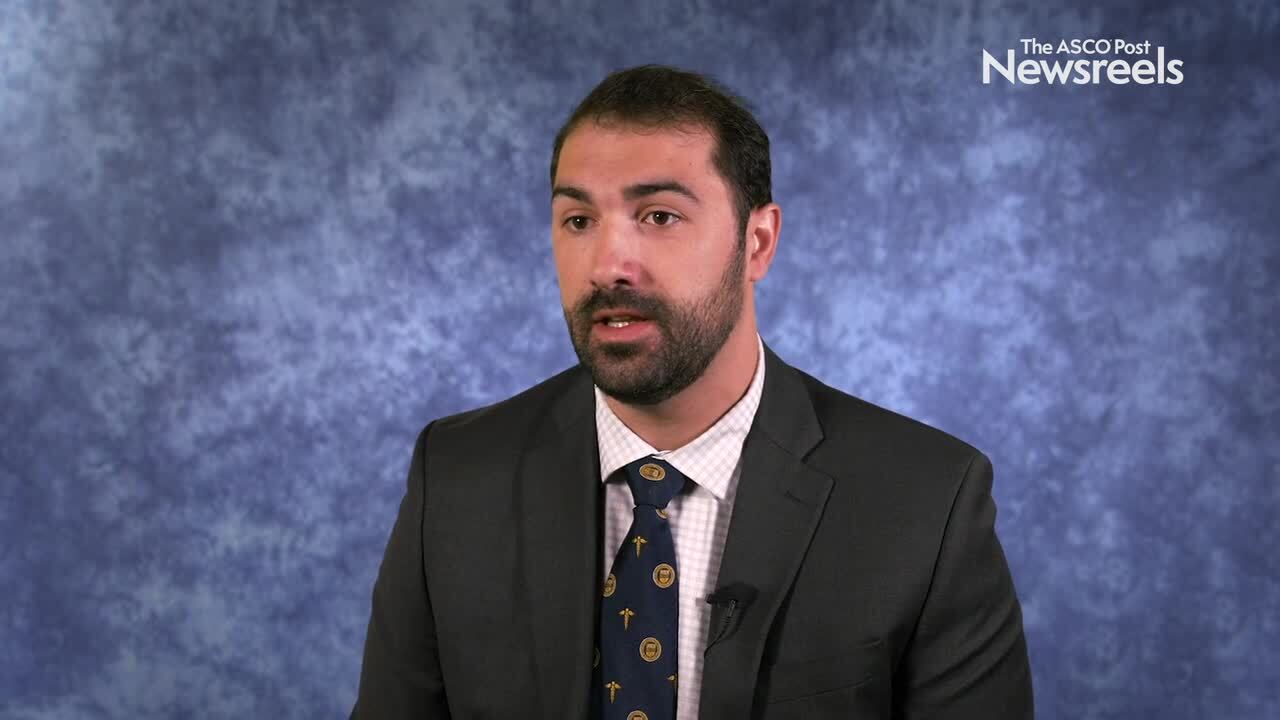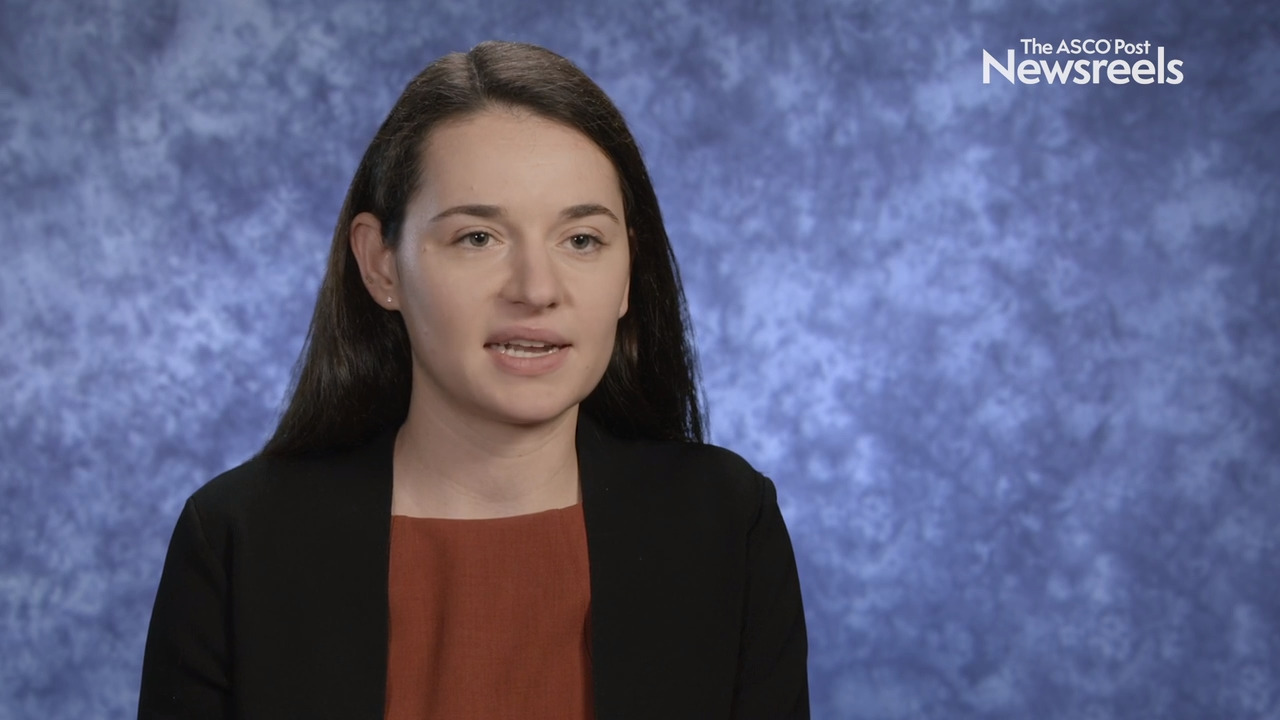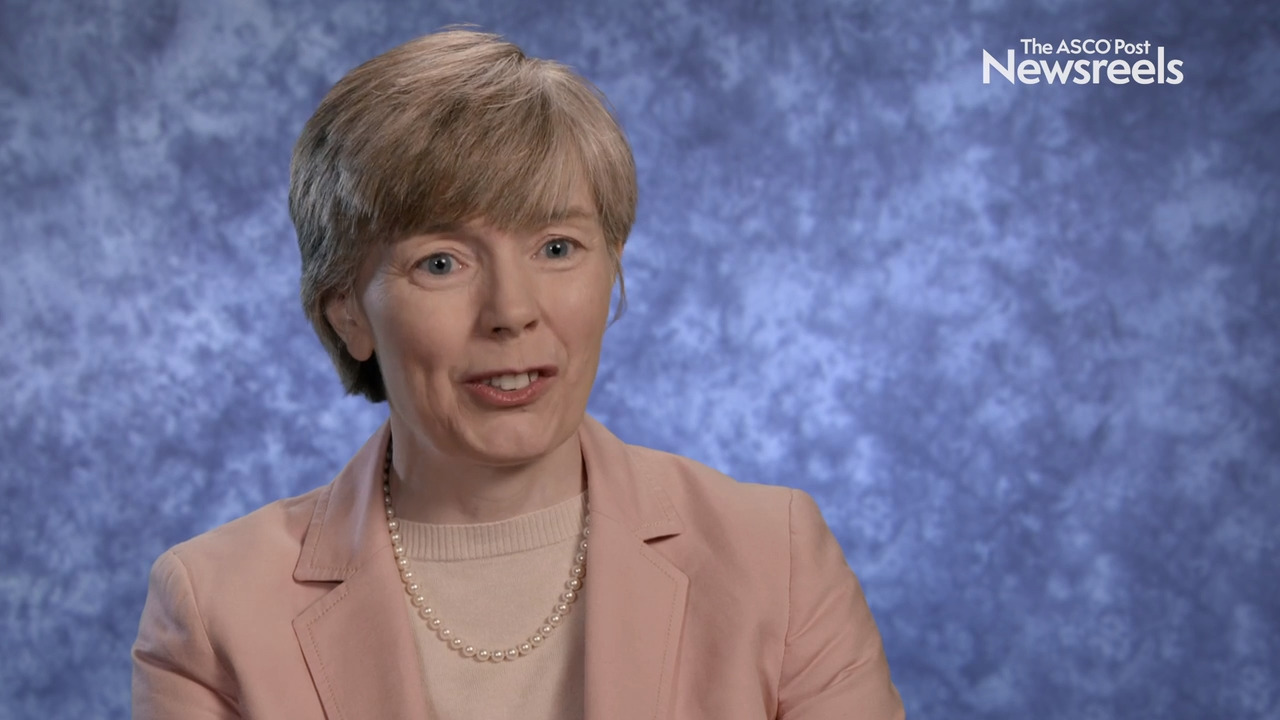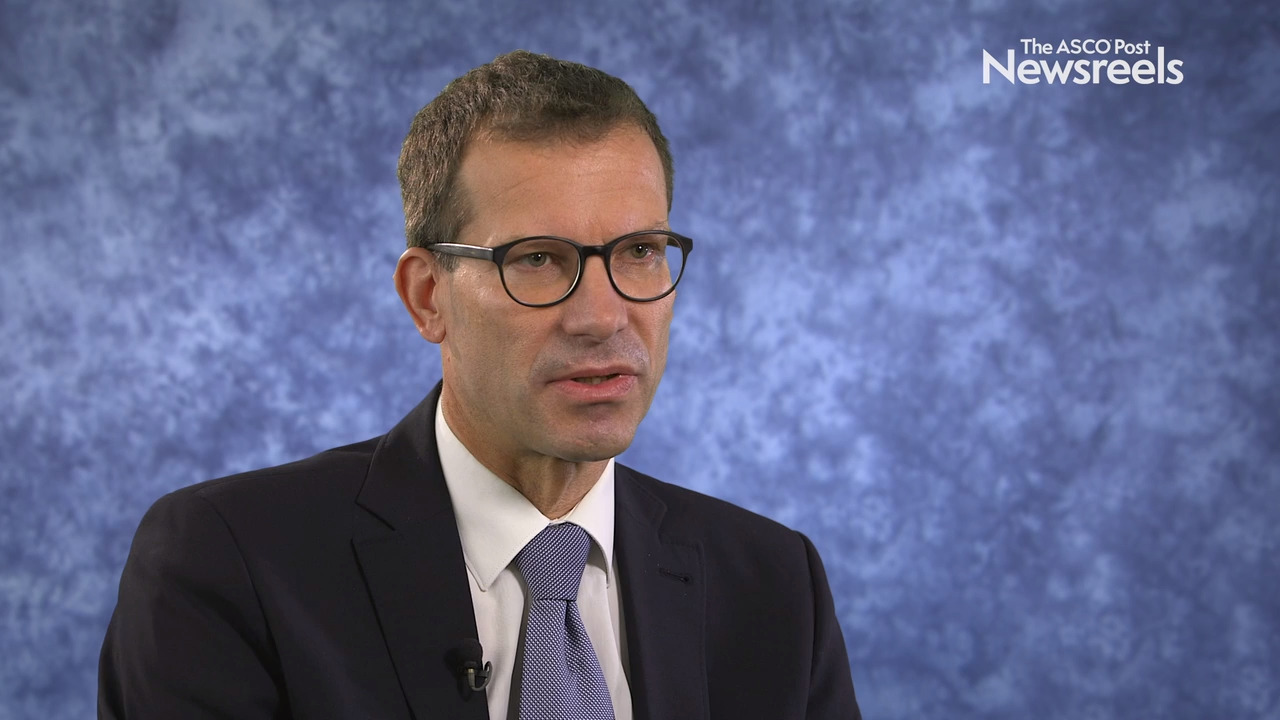Cisplatin/Gemcitabine Alone and With Veliparib in BRCA-Mutated Advanced Pancreatic Cancer
In patients with pancreatic ductal adenocarcinoma and a germline BRCA/PALB2 mutation, first-line therapy with cisplatin plus gemcitabine yielded high response rates and encouraging survival, according to Eileen M. O’Reilly, MD, of Memorial Sloan Kettering Cancer Center, who presented the findings...
Genetic Counseling and Testing of Patients With Pancreatic Cancer
Routine genetic counseling and multigene testing of patients with pancreatic cancer result in the detection of mutations that are actionable, not only for patients, but also for at-risk family members. At the Dana-Farber Cancer Institute in Boston, the use of a systemized, automated referral system ...
Maintenance Olaparib in BRCA1/2-Positive Pancreatic Cancer Yields Improved Progression-Free Survival, Preserves Quality of Life
Health-related quality of life was preserved during maintenance olaparib in patients with BRCA 1/2-positive pancreatic cancer, as evidenced by a low symptom burden over time.1 POLO investigators reported their findings in posters presented at the 2020 Gastrointestinal Cancers Symposium. Other...
Conference Highlights From the 2020 Gastrointestinal Cancers Symposium
This past January, the 2020 Gastrointestinal Cancers Symposium was held in San Francisco. More than 3,600 individuals attended and more than 900 abstracts and posters were presented. Among the highlights presented at the meeting and reported in the pages of The ASCO Post, several studies in...
Study Focuses on Role of Microbes in Pancreatic Cancer
Although bacteria are predominant in the gastrointestinal tract, they also reside on and in other parts of the body, including some unexpected places, such as malignant tumors. There are numerous reports of this phenomenon, but most have not identified a functional role for the microbes. In the...
Survival in Patients With Pancreatic Cancer Receiving Molecularly Matched Therapies
In a retrospective study reported in The Lancet Oncology, Michael J. Pishvaian, MD, and colleagues found that overall survival was better in patients with pancreatic cancer with actionable molecular alterations who received matched therapies compared with those who received only unmatched therapies ...
Preoperative Chemoradiotherapy vs Immediate Surgery for Pancreatic Cancer
In the Dutch phase III PREOPANC trial reported in the Journal of Clinical Oncology, Versteijne et al found that preoperative chemoradiotherapy did not improve overall survival vs immediate surgery in patients with resectable and borderline resectable pancreatic cancer. Benefits of preoperative...
Geographic and Racial Variability in Germline BRCA Mutation Prevalence Among Patients With Metastatic Pancreatic Cancer
In a study reported in the Journal of Clinical Oncology, Talia Golan, MD, and colleagues identified geographic and ethnic heterogeneity of germline BRCA1/2 mutation prevalence among patients screened for entry into the phase III POLO trial, which examined the efficacy of olaparib maintenance...
New POLO Data Further Support Maintenance Olaparib in BRCA1/2-Positive Pancreatic Cancer
In posters presented at the 2020 Gastrointestinal Cancers Symposium, POLO investigators reported that health-related quality of life was preserved during maintenance olaparib in patients with BRCA 1/2-positive pancreatic cancer, as evidenced by a low symptom burden over time.1 Other studies...
Automated Referral Process for Genetic Counseling and Testing of Patients With Pancreatic Cancer
Routine genetic counseling and multigene testing of patients with pancreatic cancer result in the detection of mutations that are actionable, not only for patients, but also for at-risk family members. At the Dana-Farber Cancer Institute, the use of a systemized, automated referral system that does ...
Expert Point of View: Andrea Wang-Gillam, MD, PhD
Andrea Wang-Gillam, MD, PhD, Clinical Director of the GI Oncology Program and Director of Developmental Therapeutics at Washington University in St. Louis, was the invited discussant of SEQUOIA and HALO 109-301. She tried to make sense of the two negative studies of pegylated agents in advanced...
Two Novel Pegylated Agents Fail in Metastatic Pancreatic Cancer
Two novel treatments once thought to hold promise in the treatment of metastatic pancreatic cancer have not proved to be effective in phase III trials, investigators reported at the 2020 Gastrointestinal Cancers Symposium. When combined with standard chemotherapy, a pegylated form of human...
Luis I. Ruffolo, MD, on Pancreatic Cancer: Augmenting Immunotherapy With Antibody Blockade of Semaphorin 4D
Luis I. Ruffolo, MD, of the University of Rochester, discusses preclinical studies showing that semaphorin 4D blockade may sensitize pancreatic tumors to chemoimmunotherapy combinations (Abstract 26).
Danielle S. Bitterman, MD, on Pancreatic Cancer: Noninvasive Genomic Profiling From Plasma ctDNA
Danielle S. Bitterman, MD, of the Harvard University Radiation Oncology Program and Massachusetts General Hospital, discusses an analysis of genomic and clinical data from 97 patients with pancreatic ductal adenocarcinoma with circulating tumor DNA. Mutations were most frequently detected in patients with locally advanced and metastatic disease (Abstract 753).
Expert Point of View: Richard L. Schilsky, MD, FACP, FSCT, FASCO
Richard L. Schilsky, MD, FACP, FSCT, FASCO, Chief Medical Officer and Executive Vice President of ASCO, who is also a gastrointestinal oncologist, called the 74% response rate to cisplatin/gemcitabine “remarkable.” “What’s impressive to me is the high response rate, as well as the progression-free ...
‘Unprecedented’ Responses to Cisplatin/Gemcitabine in BRCA-Mutated Advanced Pancreatic Cancer
As first-line treatment of patients with pancreatic ductal adenocarcinoma and a germline BRCA/PALB2 mutation, cisplatin plus gemcitabine yielded high response rates and encouraging survival, establishing this doublet as a standard approach in this subset of patients, according to Eileen M....
Eileen M. O’Reilly, MD, on Pancreatic Adenocarcinoma: Gemcitabine, Cisplatin, and Veliparib
Eileen M. O’Reilly, MD, of Memorial Sloan Kettering Cancer Center, discusses phase II trial findings showing that cisplatin and gemcitabine, with or without veliparib, exceeded a prespecified response rate for patients with pancreatic adenocarcinoma and a germline BRCA/PALB2 mutation (Abstract 639).
2020 GI Cancers Symposium: Cost of Pancreatic Cancer Care Over Time
In a study presented by Picozzi et al at the 2020 Gastrointestinal Cancers Symposium, researchers found that even as drug costs increased over the past decade, total inflation-adjusted pancreatic cancer care expenses declined, as did costs related to quality of life (Abstract 773). Health...
Olaparib as Maintenance Therapy for Germline BRCA-Mutated Metastatic Pancreatic Adenocarcinoma
On December 27, 2019, the poly (ADP-ribose) polymerase (PARP) inhibitor olaparib was approved for the maintenance treatment of adult patients with deleterious or suspected deleterious germline BRCA-mutated metastatic pancreatic adenocarcinoma, as detected by a U.S. Food and Drug Administration...
Genomic Aberrations and Pancreatic Cancer Subtypes
Researchers have discovered detailed new genetic information about the subtypes of pancreatic cancer. A better understanding of the disease groups may lead to new treatment options and improved clinical outcomes for this lethal disease, Chan-Seng-Yue et al reported in Nature Genetics. The study...
FDA Approves Olaparib for Patients With Germline BRCA-Mutated Metastatic Pancreatic Cancer
On December 27, 2019, the U.S. Food and Drug Administration (FDA) approved olaparib (Lynparza) as a maintenance treatment for adult patients with deleterious or suspected deleterious germline BRCA-mutated metastatic pancreatic adenocarcinoma as detected by an FDA-approved test whose disease has not ...
Early Research Shows Potential New Targets in Treating Glioblastoma, Colorectal Cancer, and Pancreatic Ductal Adenocarcinoma
Glioblastoma multiforme, colorectal cancer, and pancreatic ductal adenocarcinoma represent some of the most difficult-to-treat cancers and collectively cause more than 114,000 deaths each year in the United States. A trio of recently published basic research studies in these cancers have found...
ESMO Immuno-Oncology 2019: CXCR4 Inhibitor in Combination With Pembrolizumab/Chemotherapy for Metastatic Pancreatic Cancer
When the CXCR4 inhibitor BL-8040 was combined with the programmed cell death protein 1 (PD-1) inhibitor pembrolizumab plus chemotherapy in the second-line setting, the regimen showed promising antitumor activity in patients with metastatic pancreatic ductal adenocarcinoma. These findings were...
ESMO Congress 2019: Quick Takes From Key Clinical Trials
The ESMO Congress continues to grow as a pivotal platform for research in clinical oncology. At the ESMO Congress 2019, important findings were showcased in more than 2,200 studies, including 93 late-breaking abstracts. The ASCO Post summarized much of that news in separate articles over several...
Management of Locally Advanced Pancreatic Cancer: A Call for Action
Advances in systemic therapy and supportive care, as well as ongoing improvements in surgical techniques, have led to improved survival for many patients with pancreatic ductal adenocarcinoma. We have observed increased survival with FOLFIRINOX (leucovorin, fluorouracil, irinotecan,...
Global Burden of Pancreatic Cancer From 1990–2017
The incidence and mortality rates of pancreatic cancer have increased in 195 countries and territories over a 27-year period, according to a systematic analysis performed within the Global Burden of Disease Study 2017 and published in The Lancet Gastroenterology & Hepatology. The study is the...
Nab-paclitaxel/Gemcitabine/Cisplatin for Previously Untreated, Advanced Pancreatic Cancer
In a phase Ib/II pilot study reported in JAMA Oncology, Jameson et al found that treatment with nab-paclitaxel, gemcitabine, and cisplatin was active in patients with previously untreated metastatic pancreatic ductal adenocarcinoma. Study Details In the study, 25 patients were enrolled between...
2019 Supportive Care: Racial Disparities in Use of Hospice Care Near Death Among Patients With Pancreatic Cancer
A study investigating the utilization of hospice care among racial/ethnic minority patients following treatment for pancreatic cancer has found that African American and Hispanic patients who underwent surgical removal of the pancreas were less likely than white patients to use hospice services at...
New Results From the TAPUR Study Reported in JCO Precision Oncology
New results from ASCO’s Targeted Agent and Profiling Utilization Registry (TAPUR) Study demonstrated that single-agent palbociclib has no meaningful clinical activity in patients with CDKN2A-mutated or -deleted advanced pancreatic adenocarcinoma and cholangiocarcinoma. The results, based on data...
ESMO 2019: High Conversion Rate With Certain Induction Chemotherapy Regimens Is Associated With Improved Overall Survival in Locally Advanced Pancreatic Cancer
Induction chemotherapy with nab-paclitaxel plus gemcitabine or sequential FOLFIRINOX (fluorouracil, leucovorin, oxaliplatin, and irinotecan) followed by surgical exploration induced high conversion rates in patients with locally advanced pancreatic cancer, and conversion was associated with...
Volker Kunzmann, MD, on Advanced Pancreatic Cancer: Findings on nab-Paclitaxel/Gemcitabine and FOLFIRINOX
Volker Kunzmann, MD, of the University of Würzburg/Comprehensive Cancer Center Mainfranken, discusses the final results of a phase II multicenter trial on the conversion rate in locally advanced pancreatic cancer after nab-paclitaxel/gemcitabine- or FOLFIRINOX-based induction chemotherapy (Abstract 671O).
Sita Kugel, PhD, Receives Grant to Study Aggressive Type of Pancreatic Cancer
The deadly nature of most pancreatic tumors is well known, with less than 10% of patients with pancreatic ductal adenocarcinoma estimated to survive 5 years after diagnosis. Recent molecular analyses of pancreatic ductal adenocarcinoma have shown that a patient’s prognosis changes depending on the...
ASTRO Guideline on Use of Radiation Therapy for Patients With Pancreatic Cancer
A new clinical guideline from the American Society for Radiation Oncology (ASTRO) provides recommendations on the use of radiation therapy to treat patients diagnosed with pancreatic cancer, including when radiation treatments are appropriate, as well as the optimal dosing, timing, and...
Results From the TAPUR Study on Palbociclib for Pancreatic Cancer and Cholangiocarcinoma
New results from ASCO’s Targeted Agent and Profiling Utilization Registry (TAPUR) study have demonstrated that single-agent palbociclib has no meaningful clinical activity in patients with CDKN2A-mutated or -deleted advanced pancreatic adenocarcinoma and cholangiocarcinoma. These findings were...
Role of the YAP Regulatory Network in Pancreatic Ductal Adenocarcinoma
Researchers have decoded a chain of molecules that are critical for the growth and survival of pancreatic ductal adenocarcinoma. They say their findings, published by Murakami et al in Developmental Cell, suggest that inhibiting the YAP biologic network may effectively regress early-stage...
USPSTF Recommendation on Screening for Pancreatic Cancer in Asymptomatic Adults
As reported in JAMA, the U.S. Preventive Services Task Force (USPSTF), in a reaffirmation of its 2004 recommendation, has recommended against screening for pancreatic cancer in asymptomatic adults (a grade D recommendation).1 In developing the current recommendation, the USPSTF reviewed evidence on ...
Adavosertib Plus Gemcitabine and Radiotherapy in Locally Advanced Pancreatic Cancer
In a phase I dose-escalation trial reported in the Journal of Clinical Oncology, Cuneo et al established the phase II dose of the Wee1 kinase inhibitor adavosertib in combination with gemcitabine and radiotherapy in locally advanced pancreatic cancer. Wee1 inhibition impedes DNA damage response and ...
Surgical Resection Among Patients Receiving Primary Chemotherapy for Borderline Resectable and Locally Advanced Pancreatic Cancer
In an Italian prospective cohort study reported in JAMA Surgery, Maggino et al found that among patients receiving primary chemotherapy for newly diagnosed pancreatic ductal adenocarcinoma, conversion to surgical resection was achieved in 24% of those with borderline resectable disease and 9% of...
Germline RABL3 Mutation May Increase Risk of Pancreatic Cancer Development
Scientists who studied a highly cancer-prone single family have identified a rare, inherited gene mutation that may raise the lifetime risk of pancreatic and other cancers. Their findings were published by Nissim et al in Nature Genetics. The discovery of the previously unknown mutation could lead ...
USPSTF Recommendation on Screening for Pancreatic Cancer in Asymptomatic Adults
As reported in JAMA, the U.S. Preventive Services Task Force (USPSTF), in a reaffirmation of its 2004 recommendation, has recommended against screening for pancreatic cancer in asymptomatic adults (a grade D recommendation). In developing the current recommendation, the USPSTF reviewed...
Durvalumab With or Without Tremelimumab in Metastatic Pancreatic Cancer
In the first stage of a phase II trial reported in JAMA Oncology, O’Reilly et al found poor activity of durvalumab with or without tremelimumab in metastatic pancreatic ductal adenocarcinoma. Owing to the lack of efficacy, study expansion was not pursued. The lead-in open-label safety ...
Artificial Intelligence to Guide Management of Pancreatic Cysts
In a proof-of-concept study, an international scientific team has shown that a laboratory test using artificial intelligence tools has the potential to more accurately sort out which people with pancreatic cysts will eventually develop pancreatic cancers. Their findings were published by Springer...
AACR Immune Cell Therapies: Early Study Results Suggest Activity of Multiantigen T-Cell Therapy in Patients With Pancreatic Cancer
Findings from a small phase I study investigating a nonengineered, multiantigen-specific T-cell therapy for the treatment of pancreatic cancer has found that the therapy had clinical activity and was safe and well tolerated. The early results suggest that the immune cell therapy may provide a...
Does the Association Between Diet and Colonic Mucosa–Associated Microbiota Affect Cancer Risk?
A report published by Liu et al in The American Journal of Clinical Nutrition found an association between diet quality and microbiome composition in human colonic mucosa. The researchers found that a high-quality diet is linked to more potentially beneficial bacteria, whereas a...
Biliary Microbiome Altered in Patients Undergoing Surgery After Neoadjuvant Therapy for Pancreatic Cancer
The biliary microbiome was altered in patients who received neoadjuvant therapy prior to undergoing surgery for pancreatic cancer, according to a study published by Goel et al in HPB. Additionally, more bacteria in patients who underwent surgery after neoadjuvant therapy were resistant to...
APACT Trial: Nab-paclitaxel/Gemcitabine vs Gemcitabine Alone in Adjuvant Treatment of Pancreatic Cancer
The largest adjuvant trial in pancreatic adenocarcinoma, the global phase III APACT trial, evaluated the combination of adjuvant nab-paclitaxel/gemcitabine vs gemcitabine monotherapy in patients with resected pancreatic cancer. Results of the study were reported by Margaret A. Tempero, MD, of the...
Expert Point of View: Wells Messersmith, MD, and Allyson Ocean, MD
“THE RATIONALE for the POLO study is sound,” said invited study discussant Wells Messersmith, MD. “There’s clearly an unmet need in pancreatic cancer, and there are promising data for poly (ADP-ribose) polymerase (PARP) inhibitors in other BRCA-mutated tumors.” Dr. Messersmith is Professor and Head ...
POLO Trial Shows Maintenance Olaparib Improves Progression-Free Survival in Metastatic Pancreatic Cancer
In patients with metastatic pancreatic cancer and germline mutations in BRCA1 or BRCA2, maintenance therapy with olaparib doubled the time to disease progression and the proportion of patients who were progression-free at 2 years, in the phase III POLO trial.1 “Maintenance olaparib provided a...
Serum MicroRNAs for the Diagnosis of Pancreatic and Biliary Tract Cancers
Diagnosis of pancreatic and biliary tract cancers is complex and challenging due to the lack of symptoms and/or the difficulty of direct, invasive, and imaging-based methods of diagnosis. In an effort to develop better diagnostic markers for these diseases, Kim et al analyzed the genome-wide...
Margaret A. Tempero, MD, on Pancreatic Cancer: Adjuvant Nab-paclitaxel and Gemcitabine
Margaret A. Tempero, MD, discusses phase III results from the multicenter APACT trial, which showed that adjuvant nab-paclitaxel plus gemcitabine may be an option for patients who are ineligible for treatment with FOLFIRINOX (Abstract 4000).





